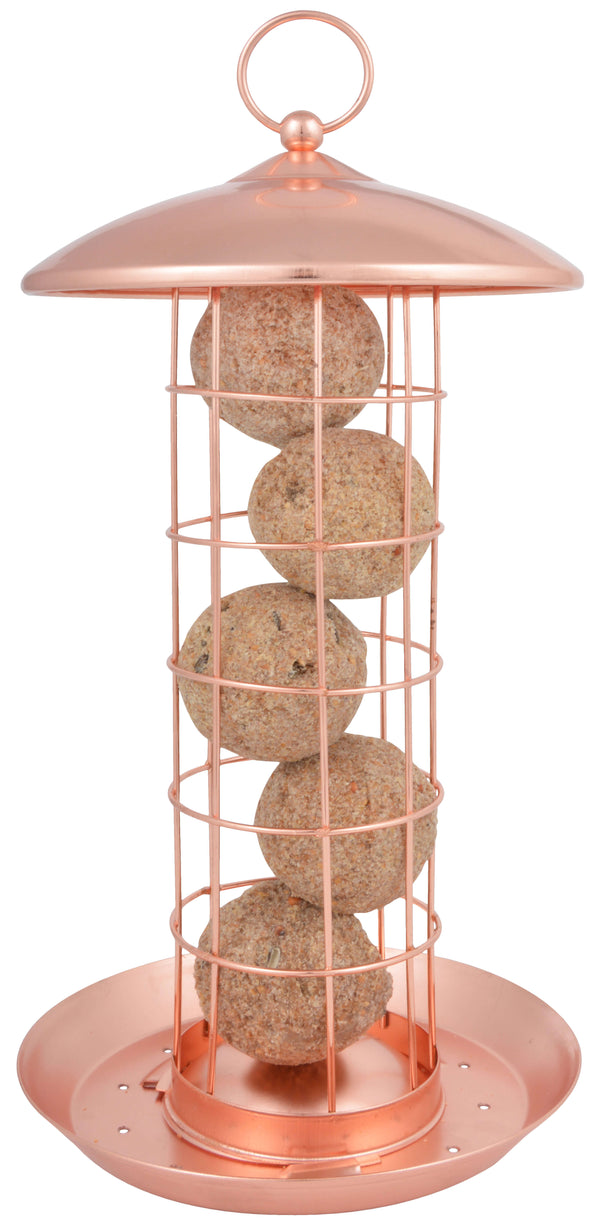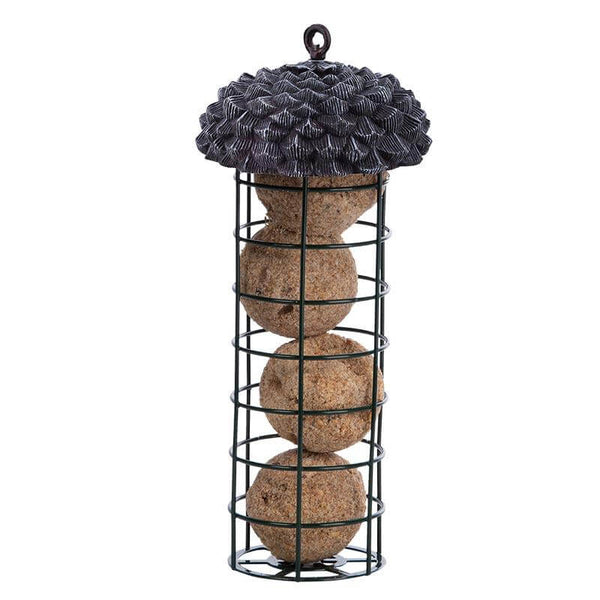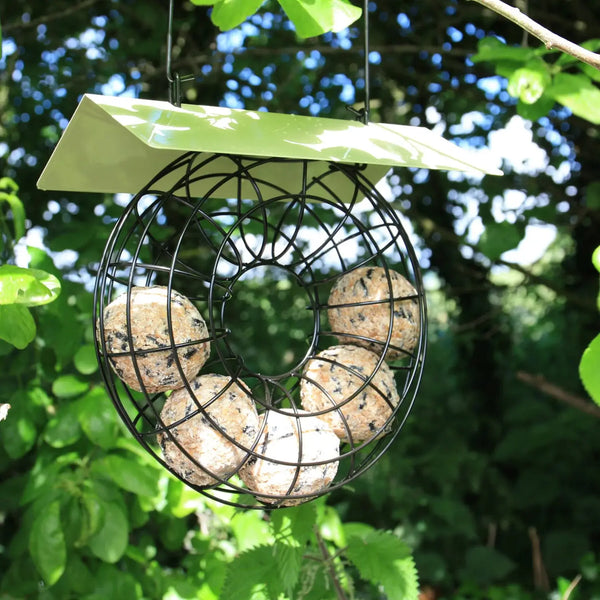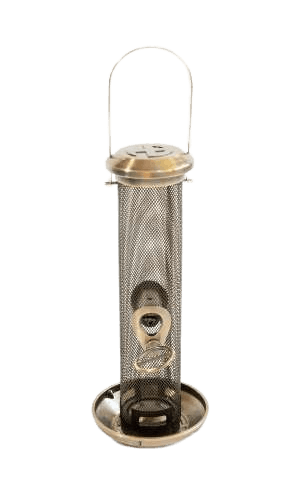How to scare away pigeons but not other birds
Pigeons are quite controversial in the world of bird-lovers.
On one level, they're something that people genuinely do enjoy seeing in town and city centers as they represent quite a sweet, non-threatening animal.

The problem is that pigeons can bully birds, meaning that bulkier pigeons in your garden could prevent other birds from visiting you.
So, many people come to the same problem - how to scare away pigeons, but not other birds?
Thankfully, since so many people have this problem, there is quite a lot that you can do to deter pigeons.
In this article, we're going to break down everything that you might need to know about this species and explain the best way to discourage pigeons from your garden.
Some information about pigeons
Pigeons are a bird that can be found almost everywhere in the UK, and around the world, too. Strictly speaking, they're quite similar to doves - so similar, in fact, that there's no difference other than aesthetics.
Pigeons and doves share small, rounded heads, as well as slim bills that have a fleshy patch at their base.
They also have rounded bodies, and dense, soft feathers. They both make soft cooing noises, rather than other, more aggressive birds, and they're both fairly uninterested in humans.
Specific pigeons
The pigeon that you're most familiar with is likely either the woodpigeon or the rock dove.
They look quite similar, being grey in color, with orange legs. The differences are slight but noticeable.
Rock doves have a grey bill, orange eyes, and bands on their wings. By contrast, the woodpigeon has block grey wings and yellow eyes.

These are the birds that you'll most likely see in towns and cities. It's worth pointing out that due to crossbreeding of different types of dove and pigeon, there may be examples of different individual birds sharing non-specific genetic traits, such as the black bands on their wings.
How to approach pigeon proofing
The best way to approach pigeon repelling is to view it as more of a marathon than a sprint - the journey towards zero pigeon poop in your garden starts with a single step.
If you're in somewhat of a hurry to make sure that the pigeons stay out of your garden, take note of where they tend to spend the most time in your home space.
If the pesky birds hang around by your windowsills, for example, skip ahead to the section of the article on the repellent gel. While we don't want to guarantee you'll immediately fend off the pigeons forever, it's certainly a way to get rid of pigeons, at least for a short while.
The downside of rushing things
The problem with taking the process of pigeon removal a little too quickly is that you're likely to scare other birds too. The reason for this is that birds tend to think in similar, simple ways.
Take the process one step at a time, and you'll find the best options to deter pigeons while not frightening other birds.
Make sure to achieve success by keeping track of the number of other birds in your garden - you can easily undo a step or two if you see a marked decrease in smaller birds entering your garden.

Things to buy that can help with pigeon proofing
There are a huge number of products available to buy that will prevent larger birds like pigeons from coming into your garden and bullying other birds.
We'll be speaking about a great number of those options later in the article, but, for now, we want to talk about a couple of household items that you could use.
The primary thing to bear in mind when trying to prevent pigeons is that they're pretty stupid. Their brain weighs just a little less than a penny - you can outthink them!

If a pigeon thinks that something dangerous is occurring nearby, it will likely fly away.
While they're bully birds, to some extent, they're also animals that are routinely predated upon by house cats and other animals.
The best option to scare a pigeon is something that moves a lot and is eye-catching. This creates the simple illusion of rapid motion in a small space, as though a predator is eating something.
The specifics
We would suggest using tinfoil, or a similarly reflective surface, to create a shining ball or object. Then, allow this object to move a little with the wind - perhaps dangling it on a string, or mounting it on a pinwheel.
This rapid, flashing movement will distress pigeons, rapidly getting rid of them.
Of course, this isn't the most elegant solution to get rid of pigeons, but it will work - this means that you can create a cheap option in your own home.
We would recommend, though, considering a few of the options later in the article. Not only will they likely be more effective, but they'll likely be more visually appealing, too.
Smaller birds and pigeons
Pigeons are quite notable in that they're commonly referred to as bullies among wild birds.
This means that they're not afraid to through their (considerable, to a small bird) weight around to get what they want.
They'd be happy, for example, to push a bluetit or a similar small bird out of the way in order to reach nuts and seeds.

Pigeons scavenge on whatever they can find, which means that they don't really find themselves at a loss for food options.
Smaller birds, though, are typically adapted to eat certain nuts and berries, depending on their location.
The bottom line
This all adds up to mean that pigeons will bully smaller birds away from a plentiful food source since they know that they can.
This behavior is encouraged by the fact that they're often ground feeders, as this means that any seeds or nuts that fall from a feeder are fair game to a pigeon.
Bird feeders
Bird feeders are a great place to start in your campaign against bully birds.
The reason for this is that modern feeders have typically been designed for certain different species of bird, rather than being all-inclusive.

For example, a bird table is typically the kind of thing that's offered for ground-feeding birds.
That's the kind of environment that a pigeon might thrive in, as it is likely to be able to simply land on the table and eat as much as it might like.
In that environment, since pigeons are so large, they also dominate a bird table, meaning that smaller garden birds can't get access to the bird food.
To prevent pigeons from poaching the food of smaller birds, we'd suggest looking for a hanging feeder.
Pigeons are too small to stand on the little perches that those bird feeders offer, which means that the best they could do would be to sit underneath the feeder and wait for some seeds to drop.
While pigeons could, theoretically, eat in that way, it's not a very convenient or efficient way to get bird feed.
This means that they'll typically move on, allowing only smaller birds to find space in your garden.
How do you attract small birds, but not pigeons?
The best way to attract small birds, but not pigeons, is to know what kind of bird food they might like.
Many birds are typically evolved to be hyper-specialized at eating a particular seed or berry. Take the crossbill as an example - they're uniquely adapted for a specific food.
Great food options
We'd suggest opting for suet for wild bird feeders, which are typically just cages you can add suet bells to, as well as sunflower hearts and nyjer seed.
These are all options that aren't the preferred options for pigeons.
When buying bags of bird seeds at the store, most brands and options will have labels telling you exactly what seeds are inside the pack.
The label will likely also tell you what birds like the seeds in the pack. While this isn't too reliable, it's worth reading, as it can give you an insight into what to expect.
If a label boasts a wide variety of exclusively desirable birds, it's likely that the pack will attract beneficial birds, while not attracting pigeons.

What will scare pigeons away?
To scare pigeons, your best bet is to use light to your advantage.
Most birds have eyes that are irritated by the sun, which means that shiny, reflective surfaces serve to deter them a little.
You can buy small, reflective items that could be used in your garden, or you could opt for a homemade version.
The problem with an option like this, though, is that it tends to scare away all birds, not just pigeons.
This isn't desirable, as we do, of course, want to see other birds in our feeders and tables.
To solely scare away pigeons, we would suggest buying or making a reflective object as you would for a scorched-earth style bird prevention program, but then only situating it in a place that pigeons are likely to be frightened by it.

Placement of the deterrent
Little birds tend not to do a lot of long-distance flying around towns and cities.
Instead, they typically prefer short hops between trees and bushes, which allows them to find their way to a new food source or nest.
Pigeons, on the other hand, do sometimes do a lot of flying around higher up in the sky.
We would suggest, therefore, hanging your reflective object quite high up - perhaps on some guttering, or on the outside of a window.
Having the deterrent out of the way of little birds won't create an obstacle for them, while it will create an obstacle for the pigeons hanging in the air above them.

What birds are pigeons afraid of?
Pigeons are a fairly worldwide species. Though the ones in Trafalgar square are iconic, they can also be found as far away as Australia - they're everywhere!
This means that it can be tricky to nail down the specific predators of a pigeon.
We've done a little digging in the UK, though, and we've found a few animals that predate upon pigeons.

Pigeons are afraid of, principally, falcons and sparrowhawks - these are the animals that eat the most pigeons.
They have some other predators, too, though these other predators typically don't rely on pigeons as a primary food source.
How to use that knowledge
Knowing that pigeons are afraid of falcons and sparrowhawks means that you can use images of them to your advantage.
An old trick is to stick the image of a predator bird on the inside of a window, facing toward where pigeons typically are - they'll recognize the silhouette, leading to them staying away from your bird feeders, out of worry that a predator's coming for them.
How do I stop pigeons from eating my bird feeder?
The best way to prevent pigeons from sitting on and eating from your bird feeder is to physically block them from doing it.
Pigeons are a lot bulkier than other birds, which means that while it may be easy to feed pigeons the same as what other birds eat, it's also easy to prevent them from eating at all.

The best solution that we have seen for this is a DIY option, but it works perfectly well.
We would suggest getting a bird table and using a loose wire mesh to, essentially, construct a cage around the food.
The idea is to use wire mesh with holes that are small enough for little birds to get through, while not allowing pigeons to get at the bird food.
This might sound tricky, but it's perfectly doable - you can even use a staple gun to secure the mesh!
We would suggest constructing a cube if you're not too DIY-savvy since that will be the easiest shape to make.
Pigeon repellent gel
To get rid of pigeons, there have been plenty of different products invented and used. The most surprising one, though, is pigeon repellent gel!
This gel is quite a simple product, really - it is slightly tacky, and essentially functions by making a surface unpleasant for birds to stand on. It presents no actual danger to the birds themselves - they can easily take off from the surface.

This product is a really great way to prevent pigeon droppings from appearing on your property since you'll likely be able to tell where the pigeons sit when they make the droppings. If you have a particularly windowsill or garden ornament, for example, adding a layer of this transparent gel will prevent the birds from sitting there and carrying on the unpleasant behavior.
Sound machines
Sound machines take a number of different forms. Most commonly, they're fairly simple devices that simply emit an ultrasonic noise for a short while that birds can detect. When they do detect that noise, they find it unpleasant and fly far enough away that they can't hear it anymore.
Sometimes, bird repelling sound machines will emit the noises that predator birds would make. Typically, this is the screeching of a hawk or a similar noise, and birds will flee from the imaginary predator.
This option isn't great for garden birds, sadly, since they're also predated upon by hawks, and they also don't like ultrasonic noises. This option might be best when deployed once or twice per day, allowing little birds to come into your garden in between blasts.
Motion-activated sprinkler
This is an old-school trick, but it's one that really works - birds don't like sprinklers. No animal enjoys being shocked by something cold and wet, and birds are no exception.
A motion-activated sprinkler typically mists a general area with a small amount of water in order to deter birds from sitting there for too long. If you find that pigeons in your garden are fairly localized, this could be a great solution for you!
The disadvantage to this could be if you are using a water meter in your home - the additional cost of running a sprinkler, while not exorbitant, is likely a cost that you'd prefer not to incur. While this is a personal choice, we'd recommend bearing it in mind.
Anti-roosting spikes
You may be familiar with anti-roosting spikes from public areas, such as on top of billboards, or above the entrance to stores in public.
Well, thanks to the internet, you can actually now purchase these anti-roosting spikes for yourself! The thing that we really love about installing anti-roosting spikes is that it is a great way to get rid of pigeons and not other birds. Pigeons, when out in the world, will have become familiar with the spikes, and know that they can't sit on them. This is a learned lesson, and the pigeons in your garden will feel the same way about it.
Garden birds, though, are typically much smaller than average pigeons. This means that they can sit within the spikes, to some extent, or may simply be able to just hop over them easily.
Using anti-roosting spikes like this is a great way to get rid of pigeons, since if they view your garden as a space that's outwardly hostile to them, they're unlikely to visit, even if they just land on the ground and walk around. This will, simply, deter them, but not other birds.










